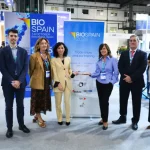The union of synthetic biology, artificial intelligence, and automation drives new biofuels, proteins, and gene therapies
Artificial intelligence enables the analysis of millions of biological data points to identify optimal solutions, while automation facilitates the transfer of results from the lab to industry.
Global challenges such as climate change, soil and ecosystem degradation, and population growth demand a determined shift toward a more sustainable economic model—through the development and implementation of new production and consumption methods that respect the planet’s balance. In this context, experts participating in the BIOSPAIN 2025 International Biotechnology Meeting, held from October 7 to 9 at Fira de Barcelona – Montjuïc, and organized by the Spanish Bioindustry Association (AseBio) and Biocat, in collaboration with the Government of Catalonia and the Barcelona City Council, presented the possibilities offered by cultivated meat and plant-based proteins, together with CO₂ bioconversion and the convergence of synthetic biology, automation, and artificial intelligence in creating sustainable foods, pharmaceuticals, fuels, and advanced materials.
Cultivated meat and plant-based protein technologies fall within a new food paradigm that seeks to address global challenges of sustainability, food security, public health, and animal welfare. As explained by Ana Torrejón Cabello, Head of Microbiology and Industrial Biotechnology at AINIA, cultivated meat—also known as in vitro or cell-based meat—is produced by culturing animal cells in specific growth media, replicating the biological process that occurs in living organisms but under controlled laboratory or pilot plant conditions. This approach, according to Torrejón Cabello, “allows for the generation of muscle tissue without the need to raise or slaughter animals, representing a technological disruption in the meat value chain.”
Plant-based proteins, on the other hand, are food matrices formulated from plant sources rich in protein (such as soy, pea, wheat, or rice) that, through extrusion, fermentation, or food engineering processes, “can simulate the organoleptic properties of conventional meat,” the expert added.
More sustainable and healthier foods
Cultivated meat and plant-based proteins offer significant advantages over traditional meat products. From an environmental standpoint, as Torrejón Cabello detailed, “they can considerably reduce the use of natural resources such as water and land, as well as greenhouse gas emissions.” At the same time, from a food safety perspective, since these are highly controlled processes, they minimize risks associated with zoonotic pathogens, antibiotic residues, and microbiological contaminants. “They also make it possible to design healthier nutritional profiles by adjusting saturated fat content, adding fiber, or enriching with specific micronutrients,” she noted.
The production of cultivated meat currently faces several technological challenges that limit its scalability and commercial viability, including managing the high production costs compared to conventional and plant-based meat alternatives. Moreover, as Torrejón Cabello pointed out, “these technologies are still in the research and development phase, while cultivated meat faces legal frameworks that are still under construction in many countries around the world.”
The development of more sustainable foods is one of the key areas of synthetic biology, a discipline that combines biology, genetic engineering, and data science to create new biological systems or improve existing ones. In simple terms, as explained by Mikel Irujo, Minister of Industry, Ecological Transition, and Digital Business of the Government of Navarre, it allows life to be designed for useful purposes—“from producing medicines or more sustainable foods to developing fuels or advanced materials.”
The convergence of synthetic biology, automation, and artificial intelligence accelerates the entire process—from the design and testing of organisms to large-scale production. As Irujo highlighted, AI enables the analysis of millions of biological data points to find the best solutions, while automation facilitates the transfer of laboratory results to industry. “Hence the importance of working toward cost efficiency and competitiveness,” he added. By sector, in the energy field, this convergence is driving new biofuels and alternative sources. “In agribusiness, it provides alternative proteins and more resilient crops. And in healthcare, it plays a key role in gene therapies, biosensors, and new drugs,” he stated.
Spain already holds a prominent position in biotechnology and, as the Minister of Industry, Ecological Transition, and Digital Business of the Government of Navarre recalled, “synthetic biology is its natural evolution, destined to become one of the engines of the bioeconomy.” Navarre, in particular, has placed synthetic biology at the center of its economic and social development strategy: “We have the business development plan BioSintNA, led by Sodena, which structures actions to connect science, business, and technology, as well as cutting-edge infrastructures such as the synthetic biology lab at IRIS Lab—the only one of its kind in southern Europe—enabling the leap from research to market.”
CO₂ bioconversion: key to advancing toward a circular economy
Transforming CO₂ into high-value products such as biofuels, bioplastics, proteins, or biomass is emerging as a key alternative for advancing toward a circular economy—focusing on sustainable solutions that turn this gas into useful resources for various sectors. As emphasized by María del Mar González Barroso, Technical Advisor in Biotechnology at Repsol, “advances in processes such as carbon capture and utilization (CCU) allow CO₂ to stop being viewed merely as waste and instead be considered a valuable raw material capable of feeding new value chains and promoting more sustainable production models.”
Specifically, González Barroso highlighted that biological processes such as gas fermentation or the use of photosynthetic organisms “have the ability to convert CO₂ into high-value products such as biofuels, bioplastics, proteins, or biomass, among others.” Among their advantages, she pointed out that they can operate with gas streams containing impurities and under mild conditions, “facilitating industrial integration and reducing treatment costs.”
Repsol has planned the construction of a plant located near its Petronor facilities, in collaboration with its partner O.C.O Technology Limited, to incorporate O.C.O’s technology for manufacturing aggregates (gravel) from CO₂ captured from the Petronor refinery and ash. In the words of Repsol’s Technical Advisor in Biotechnology, “initiatives such as eco-aggregate production, synthetic fuels, and the promotion of biological technologies demonstrate the potential to turn waste into industrial opportunities. By integrating CO₂ capture and valorization into our processes, we are not only moving toward a more efficient and sustainable industry but also fostering the creation of products that bring value to society,” she concluded.






